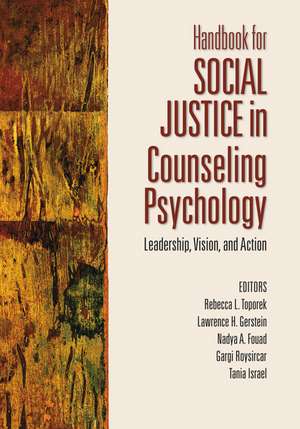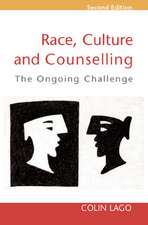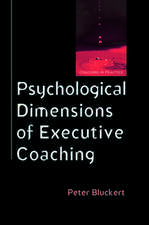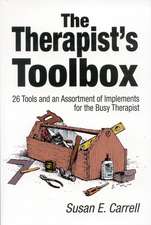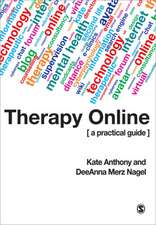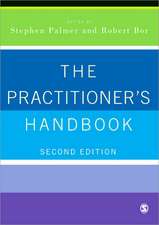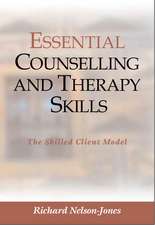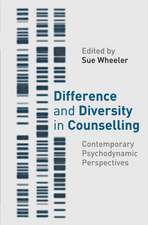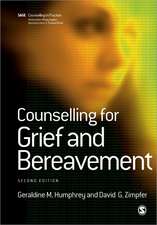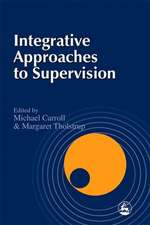Handbook for Social Justice in Counseling Psychology: Leadership, Vision, and Action
Autor Rebecca L. Toporek, Lawrence H. Gerstein, Nadya Fouad, Gargi Roysircar, Tania Israelen Limba Engleză Hardback – 14 feb 2006
The Handbook for Social Justice in Counseling Psychology: Leadership, Vision, and Action provides counselling psychology students, educators, researchers, and practitioners with a conceptual road map of social justice and social action that they can integrate into their professional identity, role, and function. It presents historical, theoretical, and ethical foundations followed by exemplary models of social justice and action work performed by counselling psychologists from interdisciplinary collaborations. The examples in this Handbook explore a wide range of settings, with diverse issues, and reflect a variety of actions.
The book concludes with a chapter reflecting on future directions for the field of counselling psychology beyond individual and traditional practice to macro-level conceptual models. It also explores policy development and implementation, systemic strategies of structural and human change, cultural empowerment and respect, advocacy, technological innovation, and third and fourth generations of human rights activities.
Key Features:
o Integrates research and ethical implications as well as guidelines for developing and evaluating specific types of social justice activities
o Addresses a comprehensive arena of issues examined from historical, theoretical, systemic, and practical perspectives
o Clarifies social justice in counselling psychology to distinguish it from other helping professions
o Provides readers with specific examples and guidelines for integrating social justice into their work supported by a solid theoretical framework and acknowledgement of interdisciplinary influences
o Includes contributions from prominent authors in counselling psychology to provide expert examples from the field
The Handbook for Social Justice in Counseling Psychology is an excellent resource for counselling psychology students, educators, researchers, and practitioners. It will be a welcome addition to any academic library or research institution.
Preț: 670.98 lei
Preț vechi: 871.41 lei
-23% Nou
128.43€ • 139.55$ • 107.95£
Carte tipărită la comandă
Livrare economică 21 aprilie-05 mai
Specificații
ISBN-10: 1412910072
Pagini: 632
Dimensiuni: 178 x 254 x 38 mm
Greutate: 1.28 kg
Ediția:New.
Editura: SAGE Publications
Colecția Sage Publications, Inc
Locul publicării:Thousand Oaks, United States
Recenzii
"Counseling psychologists often focus on clients' inner conflicts and avoid getting involved in the clients' environment. This handbook encourages counseling psychologists to become active participants in changing systems that constrain clients' ability to function. . . . Besides actual programs, the contributors cover research, training, and ethical issues. The case examples showing how professionals have implemented social action programs are particularly valuable. . . . [T]his book provides an outline for action, not only for psychologists, but also for social workers, politicians, and others interested in improving the lot of disadvantaged populations. Summing up: Recommended. Graduate students, researchers, professionals."
"This book provides as outline for action, not only for psychologists but also for social workers, politicians and others interested in improving the lot of disadvantaged populations. Recommended."
Cuprins
Chapter 2: Ethics and Professional Issues Related to the Practice of Social Justice in Counseling Psychology - Rebecca L. Toporek, Robert Williams
PART I : TRAINING
Chapter 3: Social Justice Training in Counseling Psychology: Needs and Innovations - Rebecca L. Toporek, Christopher J. McNally
Chapter 4: Incorporating Social Justice in Counselor Training Programs: A Case Study Example - Regine M. Talleyrand, Rita Chi-Ying Chung, and Fred Bemak
Chapter 5: Empowering Undergraduate Students to Be Agents of Social Change: An Innovative Service Learning Course in Counseling Psychology - Karen M. O’Brien, Sheetal Patel, Nancy Hensler-McGinnis, and Jennifer Kaplan
PART II: SCHOOLS
Chapter 6: Prevention Work in Schools and With Youth: Promoting Competence and Reducing Risks - Gargi Roysircar
Chapter 7: Prevention and Outreach with Underserved Populations: Building Multisystemic Youth Development Programs for Urban Youth - Elizabeth Vera, Brian Daly, Rufus Gonzales, Melissa Morgan, Charu Thakral
Chapter 8: Transformative Endeavors: Implementing Helms's Racial Identity Theory to a School-Based Heritage Project - Chalmer E. Thompson, Dorienna Harris, Sherri L. Edwards, and Patricia G. Garcia
Chapter 9: Promoting Social Justice Through Preventive Interventions in Schools - M. Meghan Davidson, Michael Waldo, and Eve M. Adams
Chapter 10: A Theoretical and Practice Framework for Universal School-based Prevention - Gargi Roysircar
PART III: MARGINALIZED COMMUNITIES
Chapter 11: Marginalized Communities in the United States: Oppression, Social Justice, and the Role of Counseling Psychologists - Tania Israel
Chapter 12: Seeking Social Justice for Victims of Intimate Partner Violence: Real-World Struggles in Pursuit of Systemic Change - Margret E. Bell and Lisa A. Goodman
Chapter 13: Achieving Social Justice for College Women With Disabilities: A Model for Inclusion - Barbara J. Palombi and Alisa Matteson Mundt
Chapter 14: Environmental Racism: A Call to the Profession for Community Intervention and Social Action - Azara L. Santiago-Rivera, Kristin Talka, and Amy W. Tully
Chapter 15: The Unwarranted Pathologizing of Homeless Mothers: Implications for Research and Social Policy - Lisa Cosgrove
Chapter 16: Diving Into the Hornet’s Nest: Situating Counseling Psychologists in LGB Social Justice Work - David H. Whitcomb and Michael I. Loewy
Chapter 17: Toward a Radical Feminist Multicultural Therapy: Renewing a Commitment to Activism - Susan L. Morrow, Donna M. Hawxhurst, Ana Y. Montes de Vegas, Tamara M. Abousleman, and Carrie L. Castañeda
PART IV: CAREER AND VOCATIONAL ISSUES
Chapter 18: Social Justice in Career and Vocational Aspects of Counseling Psychology: An Overview - Nadya A. Fouad
Chapter 19: Tools for Remodeling the Master's House: Advocacy and Social Justice in Education and Work - Ruth E. Fassinger, Susanna M. Gallor
Chapter 20: Individual, Programmatic, and Entrepreneurial Approaches to Social Justice: Counseling Psychologists in Vocational and Career Counseling - Rebecca L. Toporek and Robert C. Chope
Chapter 21: Social Justice through Self-Sufficiency: Vocational Psychology and the Transition From Welfare to Work - Cindy L. Juntunen, Angela M. Cavett, Rhanda B. Clow, Venessa Rempel, Rachel E. Darrow, and Adam Guilmino
PART V: SOCIAL JUSTICE IN HEALTH CARE
Chapter 22: Counsdling Health Psychology's Collaborative Role in the Community - Gargi Roysircar
Chapter 23: Working for Social Justice From Within the Health Care System: The Role of Social Class in Psychology - Joshua A. Hopps, William M. Liu
Chapter 24: Community Health Promotion Curriculum: A Case Study of Southeast Asian Refugees - Uyen K. Huynh and Gargi Roysircar
Chapter 25: Social Justice Related to Working with HIV/AIDS From a Counseling Health Psychology Perspective - Christa K. Schmidt, Mary Ann Hoffman, Nicole
PART VI: COUNSELING PSYCHOLOGISTS IN THE INTERNATIONAL ARENA
Chapter 26: Counseling Psychologists as International Social Architects - Lawrence H. Gerstein
Chapter 27: A Social Justice Approach to International Collaborative Consultation - Sharon G. Horne and Susan S. Mathews
Chapter 28: Couples Helping Couples: Consultation and Training in Peñalolén, Chile - Benedict T. McWhirter and Ellen Hawley McWhirter
Chapter 29: Bringing Social Justice to International Practices of Counseling Psychology - Kathryn L. Norsworthy with contributions by Ouyporn Khuankaew
Chapter 30: Counseling Psychology and Nonviolent Activism: Independence for Tibet! - Lawrence H. Gerstein and Doris Kirkpatrick
Chapter 31: Moving From Contact to Change: The Act of Becoming Aware - Scott L. Moeschberger, Alicia Ordonez, Jiu Shankar, and Shonali Raney
PART VII: POLICY AND LEGISLATIVE CHANGE
Chapter 32: Social Action in Policy and Legislation: Individuals and Alliances - Rebecca L. Toporek
Chapter 33: Extending the Parsons Legacy: Applications of Counseling Psychology in Pursuit of Social Justice Through the Development of Public Policy - Sandra L. Shullman, Bobbie L. Celeste, and Ted Strickland
Chapter 34: Confessions of an Abiding Counseling Psychologist - Robert H. McPherson and Clare Reilly
PART VIII: FUTURE DIRECTIONS
Chapter 35: Future Directions for Counseling Psychology: Enhancing Leadership, Vision, and Action in Social Justice - Rebecca L. Toporek, Lawrence H. Gerstein, Nadya A. Fouad, Gargi Roysircar, and Tania Israel
Author Index
Subject Index
About the Editors
About the Contributors
Notă biografică
Rebecca L. Toporek, Ph.D., is an Assistant Professor in the Department of Counseling, Career and College Counseling Specializations, at San Francisco State University. Her research and writing interests include social justice and multicultural supervision and training, advocacy competencies, attitudes toward race and poverty, systemic interventions in discrimination, and career and college counseling. She was a co-editor of the Handbook of Multicultural Competencies and is a co-editor of an emerging electronic journal of social justice in counseling and psychology. She is a founding member of Counselors for Social Justice of the American Counseling Association. She received her doctorate degree in Counseling Psychology from the University of Maryland, College Park. Her most important roles include mother, partner, sister, daughter, friend, colleague, teacher, ally, community member, and global citizen.
